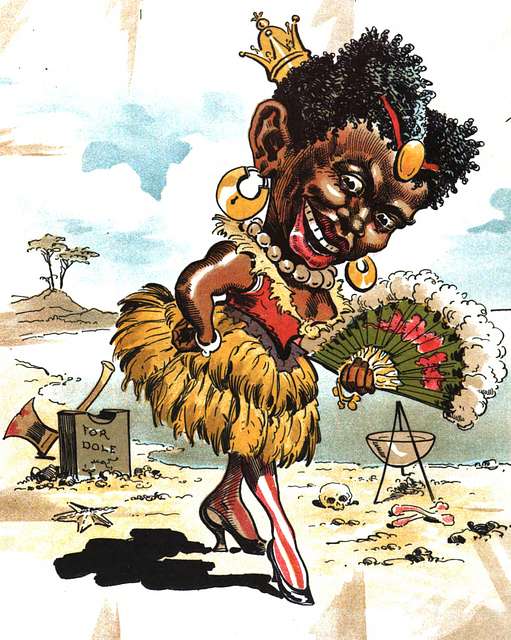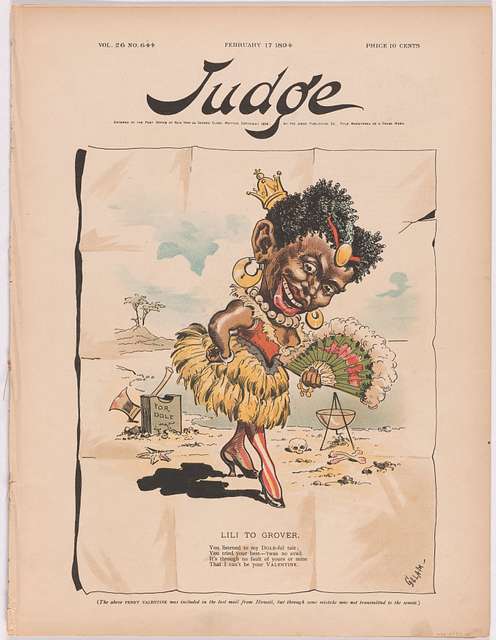
A “drag-queen” figure from 1894
The caricature above is cropped from a 1894 Judge magazine cover. The theme is “imperialism”. And it sharply features all notions encapsulated in what it means imperialism. It’s a pill to gulp Fanon’s work. It’s so simple and real even today that it relentlessly pierces the “leftist” fantasies of freedom to either incite their aggression or (for a bit smarter ones) lead their indifference and trivialization. That is how it is often blamed as a “racist” caricature.
There is actually a kind of “racism” at stake. ..but where is this racism? Unlike the blamer who wouldn’t dare to dig in, it’s definitely not in the mind of the artist, but it’s in the politically correct conception of the viewer who typically advocates to instigate the unchained desires as a recipe for emancipation to the oppressed (post-)collonial individual.
Why the theme of the Symposium is chosen as “Empires in the Grip of Imperialism”?
Let’s tell the last word first: we adhere the motto of Voltaire: Sweep first in front of the door. The fake left apparata strategy to hamper little but real gains to progressive movements, has always advocated too far fantastic targets such like “world revolution” and so on. A similar maneuver from such advocators against the distancing of Turkiye to the Western bloc and it’s rapprochment to Russia was a similar one:
“How come that you can call yourself as an anti-imperialist leftist?! What you applaud is getting rid out of one imperialist power for going under the influence of another imperialist power!“.
A purpose of this Symposium is to examine to what extent this argument is true. Is Russia today an imperialist power or not? Was it imperialist before? How to distinguish an Empire (or rather what it is defined as a ‘civilization empire‘ which became a popular term nowadays in Russia) from an imperialist state?
One should also remind here how the Ottoman Empire’s legacy and some multinational imperial fantasy was praised and promoted in Turkiye by the pro-Western liberal intelligentsia — by the soft power of imperialism — during 90s as a nostalgia, allegedly for a more egalitarian social order within the mozaic of different “nations” and cultures. Wasn’t it, this idealised romantization of the Ottoman Empire, the instigation of an imperialist fantasy over the reminiscence of an empire? Through that fantasy on which the core was assuming what it was itself that it made itself eligible to advocate the same to the periphery. The Refugee Crises of 2015 along with the organ theft made an acrid cleft in this fantasy which was hiding the bitter Real of the unipolar world system. And did it end up by the famous saying: “be careful for what you wish for, it might just come true“. What came true today from that fantasy, is actually the rising xenophobia in the West by contrast to the indwelling of an ethno-culturally more egalitarian cohabitation ethic in the Global South without even need to run such a manipulative multiculturalist discourse in public. The recent half a century history of the rise of globalism perfectly confirmed the iconic article of Prof Zizek, ‘Multiculturalism, or, the cultural logic of Multinational Capitalism’ published in New Left Review, in 1997.
The immediate distinction which would come to the mind of a person having minimal education on social sciences is that, while empire is associated with military power and direct territorial seizure, the exertion of imperialism is rather associated with soft power and cultural hegemony. The former is pre-capitalist in temporal logic, while the latter is a late-capitalist formation.
Here it is how the greatness of this caricature across centuries shows up: Victor Gillam has successfully depicted the imposition of such a manipulative soft power in the logic of Wokism in line with the LGBTQ, both operating on similar ideological and cultural traits during the first globalization (in the end of the 19th century) and in today’s globalism.

The program of the Symposium, with two important remarks
As you will see here under we avoid mentioning the names of the presentators. We just publish here the titles and the topics. We have two reasons to do it that way:
- Their names aren’t secret of course. We simply avoid allegations that they are connected to our Supra-National institute, The Istanbul Institute of Russian and Sovietic Studies (IIRSS). Our Institute is driven by a quadrumvirate, a Director (AliPolaT), a mentor (Prof-the-Redskin), an editor and an advisor. No one else is affiliated to it.
- Not names but ideas and topics are important to us. Our legendary late Prof Önay Sözer once told us that philosophy is a battlefield. Following this notice we don’t fight with personages but we fight with ideas and doctrines. And what we do is often the most effective way to avoid kinetic wars — as also advocated by Prof Zizek.
Here is now the program of the Symposium:
EMPIRES IN THE GRIP OF IMPERIALISM
APRIL 17, 2025: THURSDAY
11:00-12:30 FIRST SESSION
“The image of the “Russkiy mir” in the Russian thought of 19th century”
The Naqshbandiyya Tariqa and Government Practices in the Ottoman Empire (c. 18th– early 19th centuries)
“The problem of tolerance towards different religions in the Russian Empire in the early 20th century and the policies adopted to solve the situation: The role of Catholicism and Old Believers as example” (Online)
12:30-14:00 LUNCH BREAK
14:00-16:00 SECOND SESSION
“Dmitry Vergun: Echoes from the Carpathians in Russian Literature.”
“The Orthodox Orient: Peculiarities of the description of the Balkans by Russians at the turn of XIX-XX centuries on the example of Bulgaria (Online)
16:00-16:30 COFFEE BREAK
16:30-19:00 THIRD SESSION
“The diary of O. M. Tsyavlovsky – a new source on the Aegean Expedition.” (Online)
“Soviet-Turkish Relations under Atatürk.”
“The Traces of Mirza Gökgöl and Russian Agricultural Experts in Turkish Agriculture in the Early Years of the Republic.”
“The relations between Russia and the Visegrad Group frrom the perspective of role identity.”
20:00-22:00 DINNER
APRIL 18, 2025: FRIDAY
09:30-11:00 FIRST SESSION
“The Ottoman-Russian rivalry in the Middle East through diplomats.”
“The Unionists’ Call: Return from Paris and Korkmazov’s newspaper.” (Online)
11:00-11:30 COFFEE BREAK
11:30-13:00 SECOND SESSION
Roundtable on “Teaching and Writing Russian History”
“The Political Imagination of the Slavophilles” (Online)
13:00-14:30 LUNCH BREAK
14:30-16:00 THIRD SESSION
“The process of annexation of Crimea by the Russians and the measures taken by the Ottoman Empire.”
“The Russo-Ottoman War of 1877-1878 and the Question of Captives”
“Russia’s struggle to remain in the Eastern Mediterranean.”
16:00-16:30 COFFEE BREAK
16:30-19:00 FOURTH SESSION AND CLOSING
“Discourse in the Novel”: The Bakhtinian Tensions of Plurality and Distinctiveness in Literature.”
“Mikhail Bakhtin: Semantic Depths and the provincialisation of Europe.” (Online)
Oral history with Galatea B. Gramsci on “Gramsci.”
20:00-22:00 DINNER
APRIL 19, 2025: SATURDAY
14:00-17:00 Closed meeting with participants on summing up the results of the conference and the planning of the 4th Symposium.